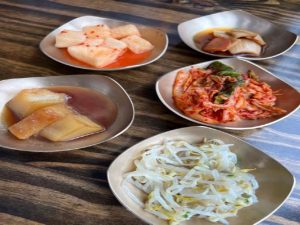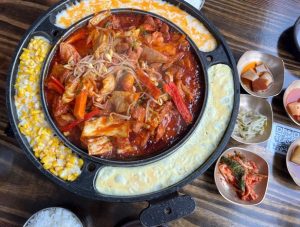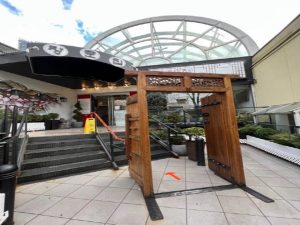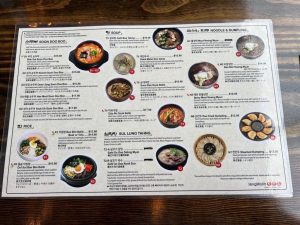Korean Immigrant Entrepreneurs in the Vancouver Food Industry: Jang Mo Jib
by Shirley Bae
The Korean Canadian community in Vancouver is relatively recent compared to other Asian Canadian communities. Nevertheless, immigration from South Korea has been steadily growing since the late 1960s, resulting in Koreans being one of the visible minority populations in Metro Vancouver today. The increasing growth of Korean immigrants also led to the establishment of Korean small businesses. Despite the majority of the first-generation Koreans being educated professionals, they were unable to get a job due to their lack of English language skills and experience in the Canadian job market, resulting in many becoming immigrant entrepreneurs. For instance, they would open a Korean grocery store or a restaurant as the responsibilities would not require fluency in English. Moreover, the immigration growth enlarged the desire of Koreans to cure culinary homesickness as the distinct character of Korean cuisine provides Korean individuals with a reminder of the uniqueness of the Korean culinary culture. Due to the continued increased market demand for Korean cuisine, Korean restaurants strive to reinforce the understanding that Koreans have a distinct culture for both Koreans and non-Koreans, which not only contrasts from mainstream Canadian culture, but also the cultures of other immigrant populations such as Chinese, Japanese, and Vietnamese. Therefore, the Korean immigrant entrepreneurs in Vancouver have been promoting minjok jucheseong, the Korean national identity, through Korean cuisine by ensuring the Korean Canadians to maintain their food practices while also enabling the Korean culture in Vancouver.
Top must-try foods in South Korea, such as Korean BBQ, Tteokbokki and Bibimbap, can be found in Jang Mo Jib – a chain Korean restaurant in Metro Vancouver. Gil-Bong Moon, the owner of Jang Mo Jib, shared his successful business journey in the Vancouver food industry with UBC HIST 483 class in 2007 and I will be drawing from the interview throughout this essay. Once Moon immigrated to Vancouver, he decided to open Jang Mo Jib in 1992 due to his belief in the continuous rise of the Korean population in Vancouver and how Korean cuisine will eventually gain popularity in the area. Given the multicultural nature of Vancouver, he recognized the value of support from both Korean and international customers.

Banchan from Jang Mo Jib (Photo taken by the author)

Iron Wok Chicken BBQ from Jang Mo Jib (Photo taken by the author)
“I am proud to say that the food in my restaurant is more traditional and folksy than many of the popular dishes served in Korea”
said Moon in his interview with HIST 483 class. Moon and his family made a consistent effort to the authenticity of the food by preparing the dishes rigorously, frequently visiting Korea for research and making amendments to his wife’s recipe whenever necessary. Under the leadership of his wife in the kitchen, the chefs at Jang Mo Jib are able to make authentic Korean cuisine. Additionally, they not only offer various types of authentic Korean dishes on the menu, but also create a similar dining experience as one would have in Korea.
For instance, the banchan, known as side dishes in Korean, is offered to customers to complement the main meal. Kimchi, a staple food in Korean cuisine, which is often known as a national identity to Koreans, is also served as banchan. This distinct Korean food culture establishes a home-cooked atmosphere for Korean customers while introducing a new dining experience for non-Korean customers. Their authentic and delicious dishes quickly captivated the Korean customers, allowing Moon to open several other Jang Mo Jib chains throughout Metro Vancouver and create a food preparation factory where they utilize a standardized recipe to ensure all chain restaurants have a consistent taste. Thus, the popularity of Jang Mo Jib among Korean customers positively influenced the global customers to try out the new cuisine. Ultimately, Moon’s business goal to provide Koreans with a sense of home-cooked feeling with their dishes while introducing Korean cuisine to the remaining populations in Vancouver has been successful.

Jang Mo Jib in Downtown Vancouver (Photo taken by the author)

Jang Mo Jib’s Menu (Photo taken by the author)
While serving Korean traditional dishes, Moon’s initiatives to expand the authentic Korean culture through Jang Mo Jib are demonstrated at the restaurant. To begin with the name of the restaurant, Moon commented in his interview with HIST 483 class that:
“Jang Mo Jib plays an important role in Korean sentiment because Jangmo (mother-in-law) represents the best impression.”
This stresses the Korean patriarchal society and family structure as Mother-in-law does her best to treat his son-in-law whenever he visits their home, and therefore, the name of this restaurant acts as a stepping stone to represent the Korean identity in the community. Furthermore, once you enter the restaurant, you can hear Korean songs playing in the background, stimulating national sentiment to the Korean customers while introducing the Korean popular culture to the international customers. The success of Jang Mo Jib has led the Downtown branch to create a karaoke bar. Karaoke culture is also a distinct Korean group singing culture, which emphasizes his attempt to raise the Korean identity by creating this space for Koreans and non-Koreans to enjoy together. Also, he caters to the more frequent international customers, such as Chinese and Japanese, as demonstrated through the restaurant’s menu. The menu at Jang Mo Jib includes Korean, English, Chinese and Japanese, which would allow the Chinese and Japanese customers to have a better understanding of each dish. Accordingly, the high demand for Chinese and Japanese populations highlights the racial, cultural and linguistic affinities between the Koreans, Chinese and Japanese. This phenomenon is also demonstrated with Italian immigrants and Argentines and their shared consumer experiences in Buenos Aires.
In order to target both Korean and non-Korean customers, Jang Mo Jib’s advertisements appeared in both Vanchosun and Vancouver Sun. Vanchosun, the Korean Canadian Newspaper publisher that started in 1999, has been promoting Jang Mo Jib as a home-cooked style restaurant where one could spend time with other Koreans while drinking Korean alcohol and listening to Korean music. This has been successful as a Vanchosun article wrote that a recent Korean immigrant stated how the exotic atmosphere in Vancouver intimated her; however, visiting Jang Mo Jib created a comfortable and familiar sentiment as she could enjoy the Korean dishes that she was unable to cook by herself. Simultaneously, Jang Mo Jib’s advertisements and articles in the Vancouver Sun helped attract a wide range of consumers who were seeking authentic Korean food. For instance, John Kenny wrote in his article that Jang Mo Jib
“offer[s] totally authentic, kick-boxing style dishes that [he has] never seen outside of Seoul.”
With the growing popularity of Korean culture in the entertainment industry around the globe and the increasing number of Korean Immigrants in Canada, there may also be a rise in Korean immigrant entrepreneurs in the Vancouver food industry. Hence, Korean immigrants entrepreneurs in the food industry will continue to flourish to satisfy the culinary homesickness of the Korean immigrants and present the unique Korean cuisine for non-Koreans.
Bibliography
Kenny, John. “Barber’s Best.” The Vancouver Sun. Jan 27, 2000. (accessed February 15, 2022).
Kim, Jeong-gi. “랍슨의 한국 먹거리 ‘좋아, 좋아.’ [The Excellent Robson’s Korean Cuisine]” Vanchosun. March 10, 2002. (accessed February 12, 2022).
Song, Marc. “The Vancouver Korean Community : Reestablishing Status within the Canadian Context, 1965-1997.” Retrospective Theses and Dissertations, 1919-2007. University of British Columbia, 1997. Accessed February 15, 2022.
Stainsby, Mia. “Patrons rediscover taste for Korean food.” The Vancouver Sun (1986-2016), Mar 06, 2008. (accessed February 15, 2022).
Yu, Henry, Eleanor Yuen, and Mary Chan, Jooyoung Choi, Andrew Dhillon, Jerry Kwok, Henry Lai, et al. “[Eating Global Vancouver: Jang Mo Jib].” UBC INSTRCC. Vancouver, 2007.
Zanoni, Elizabeth and ProQuest (Firm). Migrant Marketplaces: Food and Italians in North and South America. Urbana, Chicago: University of Illinois Press, 2018.
